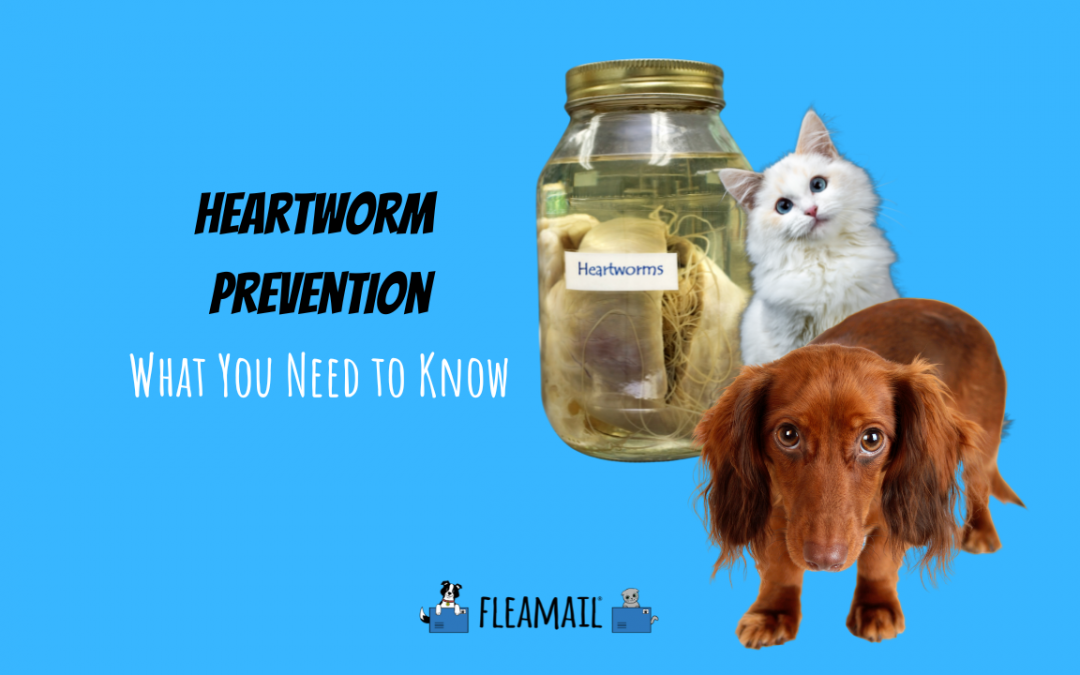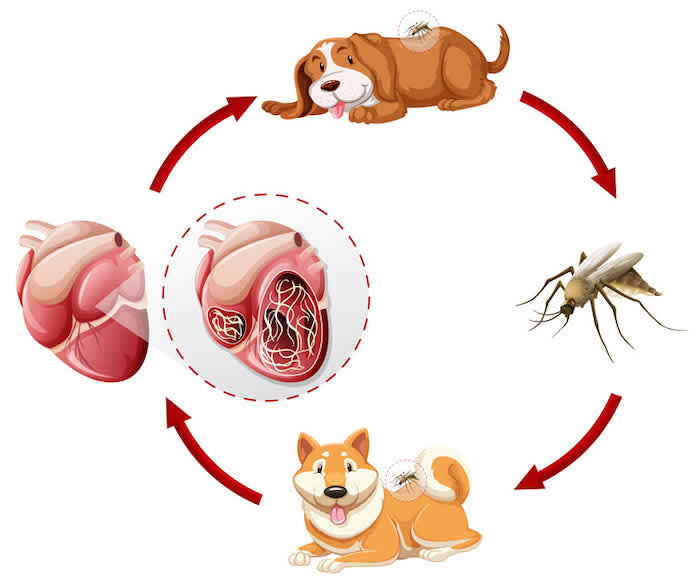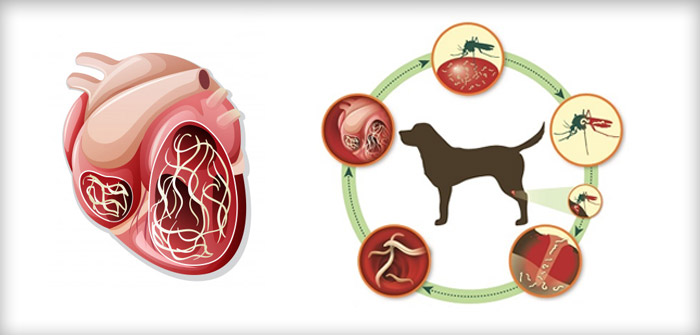In today’s FleaMail blog we will go over the basics of heartworm. What it is, how to prevent it and what to do if you suspect your pet has been infected.
What is heartworm?
Heartworm, or dirofilaria immitis, is a parasitic worm that lives in the blood vessels of your pet. Like their heart, arteries and lungs where they feed on blood and can grow up to 12 inches long! The heartworm’s life cycle starts with an infected mosquito biting a dog or cat and then introducing larvae into their bodies via the mosquito’s saliva. There are some other common ways pets contract heartworm besides mosquitoes. They include heartworm larvae in the rain, coming into contact with other infected pets or even fleas that carry heartworms.
Heartworm larvae can stay in a pet’s body for up to a year before reaching adulthood and moving on to the heart where they will reside, mate and produce more heartworm larvae. Even though cases are far more common on the east coast, the best way to think about heartworm is, “if you have ever seen a mosquito where you live, your pet is at risk of heartworm.”
What can it do to my pet?
Heartworm is very serious business! It can cause severe damage or even death if not treated in time. Some of the problems heartworms may cause are; heart disease, severe lung disease, potential organ damage, fluid build-up around the abdomen (peritonitis) and death if left untreated. Initially, you’re going to see not much, which is a problem because there’s a bit of lead time between the infection and an owner noticing the dogs got a problem; it can even be up to a couple of years. All the while this crawly bugger is doing damage to your pet.
Difference between cats and dogs.
While primarily affecting dogs it is now quite common in Australian cats too. However, how they will affect your pet is very different.
Dogs – The dog is what’s called a natural host for heartworms, meaning the entire life cycle is undertaken in a dog. If untreated, their numbers can increase, and dogs have been known to harbor several hundred worms in their bodies. Heartworm disease causes lasting damage to the heart, lungs and arteries, and can affect the dog’s health and quality of life long after the parasites are gone. For this reason, prevention is by far the best option, and treatment—when needed—should be administered as early in the course of the disease as possible.
Cats
Heartworm disease in cats is not the same as dogs. The cat is an atypical host for heartworms, and most worms in cats do not survive to the adult stage. Cats with adult heartworms typically have just one to three worms, and many cats affected by heartworms have no adults. While this means heartworm disease often goes undiagnosed in cats, it’s important to understand that even immature worms cause real damage in the form of a condition known as heartworm associated respiratory disease (HARD). Moreover, the medication used to treat heartworm infections in dogs cannot be used in cats, so prevention is the only means of protecting cats from the effects of heartworm disease so is wildly important.
What should I look out for?
Signs of heartworm disease in dogs may include a mild persistent cough, reluctance to exercise, fatigue after moderate activity, decreased appetite, and weight loss. For cats it’s very hard to see any signs of heartworm infection on the outside, blood is causing havoc internally.
As heartworm disease progresses, pets may develop heart failure and the appearance of a swollen belly due to excess fluid in the abdomen. Dogs with large numbers of heartworms can develop a sudden blockages of blood flow within the heart leading to a life-threatening form of cardiovascular collapse. This is called caval syndrome, and is marked by a sudden onset of laboured breathing, pale gums, and dark bloody or coffee-coloured urine. Without prompt surgical removal of the heartworm blockage, few dogs survive.
So, what should you do if you suspect your pet is suffering from heartworm?
There are quick and easy heartworm tests you can have your veterinarian run. They do this by taking a blood sample and checking it for heartworm antibodies. As I’m sure you can tell (or know) these tests aren’t always cheap. The best (and cheapest) way to fight heartworm is with preventative medications.
Prevention is key!
The takeaways from all of this?
1. Cats, once infected with heartworm, unfortunately cannot be cured as the medication we use to kill adult heartworm is poisonous to cats. 2. Heartworm treatment for a dog is incredibly expensive, very long-term (generally daily medical treatments for months) and, for dogs with adult heartworm, surgical intervention is generally needed. This is why prevention for heartworm is exceedingly important.
As we know parasites are always around, regardless of the season, which is why it’s important to keep your pet on regular heartworm prevention medications throughout the year. The best way to prevent heartworm is by giving your pet regular preventative treatments. This can be done at a vet clinic where they will administer heartworm prevention medication as an injection, heartworm control spot-ons or chews.
This is done to prevent heartworms from developing in your pet’s system. Thankfully we can handle all this for you at FleaMail. We offer heartworm prevention in a monthly chew form for dogs and a spot on for cats, which is easy to give to your furry friend and allows you one less thing to worry about when it comes to your pet’s health!
There may be a lot of information to digest in this blog, but it’s important to know because heartworm is not something you want your pet to get.




